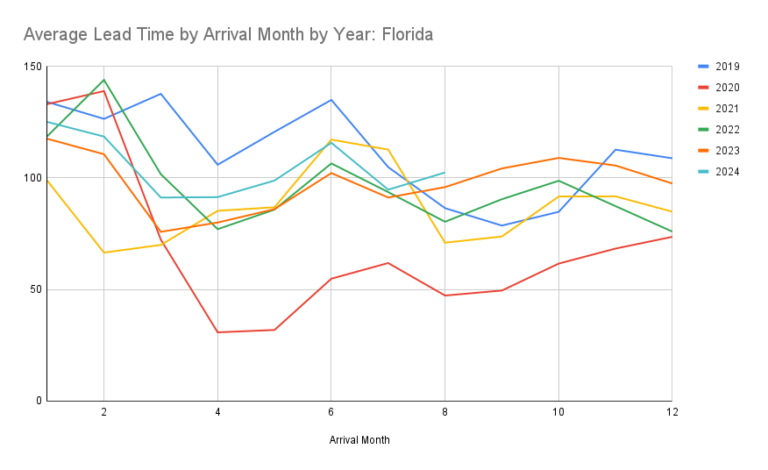In 2023, Airbnb customers paid an average of 36% in fees in addition to nightly rates. In many cities, that number was over 45% with 15-16% from Airbnb’s service fee. Beginning April 1, Airbnb is introducing yet another fee that marks a significant change for both hosts and guests.
Guests who pay in a currency that is different from the listing’s currency will now incur an additional 1.5%-2% in service fees. The charge will elevate the guest service fees to an average of 16.5% of the subtotal. This rate hike is expected to have a profound and disproportionate impact on cross-border transactions, which constitute a considerable segment of Airbnb’s bookings.
Impact on Hosts
For hosts, this new fee structure brings an added layer of complexity. The hosts with the highest exposure are those in tourist hotspots and in long-travel destinations, like islands. Additionally, high-end rentals that attract international travelers will see a significant increase in total costs passed on to their guests due to their high price point.
Marketing experts suggest high-risk hosts monitor their pricing strategies and potentially reduce nightly rates to account for the additional charges to guests if occupancy falters as a result. The implications for listings that operate on a Host-Only fee model remain unclear, though it is confirmed that hosts will continue to receive their payouts in their local currency.
The Rationale Behind the Change
This strategic move by Airbnb seems to be two-fold. In part, it’s driven by a desire to capitalize on the significant volume of cross-border bookings, which represented around 45% of Airbnb room nights from January to September 2023. By imposing an additional fee on these transactions, Airbnb stands to increase its revenue from the substantial $80 billion in total gross bookings anticipated in 2024 and improve its operating margin overall.
Separately, Airbnb is looking to redistribute risk of currency volatility to guests. Historically, Airbnb assumed this risk. If the value of a currency changed significantly between the time of booking and the time of payment to the host, Airbnb would absorb any financial loss or gain resulting from this fluctuation. However, this can amount to substantial financial implications for the booking behemoth and the fee will serve to buffer any potential impact to their bottom line.
Broader Implications
The introduction of this fee raises several questions about its broader impact:
- Pricing Strategies: How will this new fee affect the pricing strategies of hosts, especially those relying on pricing tools to remain competitive across Online Travel Agencies (OTAs)?
- Host Pricing Adjustments: Will hosts feel compelled to lower their prices for international guests to offset the new fee?
- Alignment with Airbnb’s Goals: This move seems at odds with Airbnb’s stated objectives of enhancing affordability and reducing the prevalence of additional host-imposed fees (such as for cleaning). How does this reconcile with their broader strategy?
- Consumer Reaction: Will guests notice this fee increase, and if so, how will it affect their booking behaviors?
Airbnb’s Growth Strategy in 2024
It’s essential to contextualize this change within Airbnb’s broader growth strategy for 2024. The company is focusing on expanding in underpenetrated international markets outside of its strongholds in the US, Canada, France, and Australia. Alongside reliability and affordability improvements, Airbnb plans to introduce new products and marketing initiatives, develop new pricing tools, and encourage more individual hosts to join the platform. This growth strategy is fueled by heavy investment into artificial intelligence. The OTA has been at the forefront of the industry in incorporating AI and machine learning onto the platform and readily discusses the future with AI.
As Airbnb navigates these changes, both hosts and guests must stay informed and adapt to the evolving landscape. The introduction of this new fee underscores the dynamic nature of the sharing economy and the need for platforms like Airbnb to balance revenue generation with user experience and market competitiveness.
The Solution for VRMs and Hosts
As other OTAs follow Airbnb’s trend, margins will continue to thin against the host’s control. The solution to ensure market competitiveness is to incorporate the same AI technologies Airbnb is using to support its own growth strategy. With AI-backed direct booking sites, host’s not only reduce their exposure to margin and revenue loss, but actually counteract the OTA’s plans to engulf the market share of bookings.
Leaders like Bill Gates and Benedict Evans cited travel as one of the main industries for significant AI disruption in the next five years. AI’s ability to offer personalized experiences based on preferences and intent reduces booking friction and improves the guest experience. However, the expensive and time-consuming work to build and implement AI models was previously cost-prohibitive for non-tech giants.
Aidaptive’s mission to democratize access to OTA-grade AI has allowed leading VRMs to not only secure their market share with the technology, but increase it against OTAs. Investment in AI allows VRMs to take back control of their business and long-term growth strategies to secure their place in the future of the industry.


